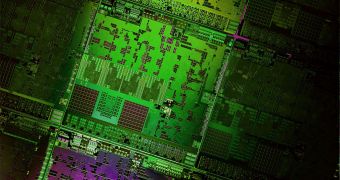Advanced Micro Devices has been very active lately, primarily because of the upcoming Computex Taipei trade show (June 4 – 8, 2013). That doesn't mean it is putting everything off until then though.
In fact, the Sunnyvale, California-based company made a point of releasing its new Accelerated Processing Units earlier (Richland, Kabini and Temash).
Temash even got the 2013 "Best Choice of Computex Taipei" award the other day.
So now that the consumer segment is well covered, the company is servicing the low-power server market.
Long story short, AMD has introduced the AMD Opteron X-Series low-power server chips, formerly known as Kyoto.
There are two of them: the Opteron X1150 CPU and the X2150 APU.
That's right, the former, while it does have four x86 Jaguar cores (up to 2 GHz clock speed) and 9-17W TDP (thermal design power), lacks integrated graphics.
The latter, though, has a Radeon HD 8000 with 128 stream processors and 266 – 600 MHz frequency. Its TDP is 11 – 22W.
The chips also possess DDR3-1600 memory controllers and 2 MB cache (L2).
"The data center is at an inflection point and requires a high number of cores in a dense form factor with integrated graphics, massive amounts of DRAM and unprecedented power efficiency to keep up with the pace of innovation of Internet services," said Andrew Feldman, corporate vice president and general manager, server business unit at AMD.
"AMD has a proud history of server innovation, and the AMD Opteron X-Series processors challenge the status quo by providing unmatched capabilities to drive the most energy-efficient servers in the industry."
AMD's X1150 CPU has a price of $64 / €50 – 64, while the X2150 will ship for $99 / €77 – 99. HP has already enlisted them for its Project Moonshot servers.
"Fundamental changes in computing architectures are required to support space, power and cost demands organizations need to deliver compelling, new infrastructure economics," said Paul Santeler, vice president and general manager, hyperscale server business segment, HP.

 14 DAY TRIAL //
14 DAY TRIAL //